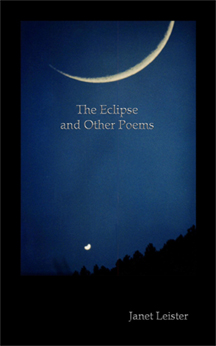
|
|
The Eclipse and Other
Poems Review by David Matthews One need not study under Harold Bloom at Yale to be able to pick up on the theme of love in Janet Leister's new book The Eclipse and Other Poems. Nor need one engage in the kind of close reading Camille Paglia gives in Break, Blow, Burn to note that that Leister never settles for easy idealization or stereotype. She writes about affairs of the heart — and of the body, for love is never just spiritual nor just physical — with awareness that our feelings in love are multiple and often in conflict with one another. Love in these poems is no simple thing. There is no Valentine's Day heart and box of chocolates love in these pages, yet it is not the hard-boiled, loser-love idiom of Bukowski and his acolytes that gets served up in its place. Leister's love is too complex and interesting for either of these fantasies. Her love plays out in dualities, the coupling of Eros/Agapé, physical/spiritual, fidelity/betrayal, "expert at sex/virgin at love" (as she puts it in "Enticement"). Love rewards, and love hurts. The title poem, "The Eclipse," sets the tone with figures of light and shadow, waxing and waning, approach and retreat, as the lovers "dance among the constellations / forever embraced, but never touching." Like heavenly bodies bound by gravity, they are "locked in orbit through the ages." Attraction, the desire to bask in the lover's light — "when you shine upon me / I radiate your love" — weighs against fear that the self will be lost in "celestial passion and divine love" or overwhelmed by the lover's greater brightness. Leister's lines are clean and clear, her imagery sharp and focused. The two lovely short poems "Blackberries" and "For Akbar" stand out for their concision and sparkle. The English of each poem is accompanied by a translation, which the poet informs me is Farsi (Persian). I do not know Persian poetry, so cannot speak to its influence on these two poems except to say that whatever the influence the outcome is a good one. "Blackberries" couples the lover's hair that "like the blackberry grows / sweet, wild, beckoning" with the beloved's heart that also "like the blackberry grows," but this time "surrounded by a palace of thorns." The sweetness and the thorns are both part of love's package. We do not get one without the other. "For Akbar" takes up another of Leister's recurrent themes: love's intoxication and the element of submission, surrender of self, that accompanies it. You are the fire that purifies me Love brings intoxication, passion, bliss, but these never come without exacting a price, here with the suggestion of dependence, as of the beggar dependent on the other for sustenance. Nothing is got for nothing, as Emerson put it. "The Wall" steps away from romantic and sexual love to address the relationship between daughter and father. I say "daughter" taking the narrative "I" of the poem to be the "I" of the author, taking this poem and others in the volume to be largely autobiographical, although this may not be the case. A chance encounter: I saw you today prompts recollection, "I remember you hunting," and there follows a straightforward, quietly lyrical description of a self-reliant man who hunts deer with arrows he makes himself, a man who once tried to jump over the waterfall Judicious use of hyperbole — where "fell a hundred miles" indicates he experienced quite a fall — makes for an arresting image that stands out against the otherwise purely realistic but no less compelling description in the rest of the poem. It is only in the closing two verses, on line 28 of a 33-line poem, that we learn the person addressed is the poet's father and it is his ashes to which she speaks: how then did you end up
here "The Wall" illustrates the economy and restraint that are a feature of the poems in this volume. Not once in "The Wall" does the narrator explicitly describe her subjective, inner state. Not once does she use words such as "love," "grieve," "miss." The depth of emotion the poem conveys and prompts in the reader is a product of this restraint. Leister does not have to explicitly state her feelings. The reader feels them. Disclosure note: Janet Leister was a founding member and original web
master of Quill and Parchment and remains listed on the staff page as
consulting techno geek. As I was not previously familiar with her work, I
felt a twinge of apprehension when approached about reviewing her book for
this publication. What if these poems failed to strike a chord, or worse,
what if I found them not to my taste at all? That would be awkward, to say
the least. As should be clear from the review, my apprehension was wholly
unfounded. This book is a pleasure to read. Return to:
|


